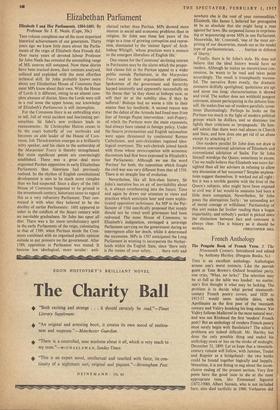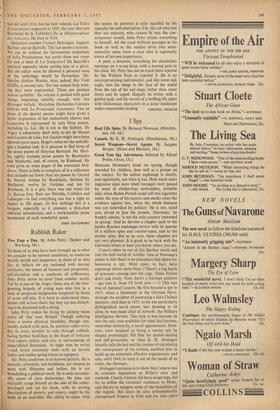French Anthology
The Penguin Book of French Verse. 3. The
Nineteenth Century. Introduced and edited
by Anthony Hartley. (Penguin Books, 5s.) Tuns is an excellent anthology. Anthologies arouse one's worst instincts. Like the peevish guest at Tom Brown's Oxford breakfast party, one cries, 'What, no larks?' The selection may be as full as the table was loaded: no matter, one's first thought is what may be lacking. The problem is to decide what period nineteenth- century French poetry covers, and 1820 to 1913-17 would seem suitable dates, with Apollinaire as the first poet of the twentieth century and Valdry breaking his long silence. Yet Valery follows Mallarme in the most natural way; and was not Rimbaud the first 'modern' French poet? But an anthology of modern French poetry must surely begin with Baudelaire? The editor's problems are indeed difficult. Mr. Hartley has done the only possible thing and ended his anthology more or less on the stroke of midnight, December 31, 1899. Let us hope that a twentieth- century volume will follow, with Jammes, Toulet and Regnier as a bridgehead : the two books could be bound together logically and happily. Meantime, it is not fitting to nag about the incon- clusive ending of the present section. Very few poets have the good taste to die at the most appropriate time, like Emmanuel Signoret (1872-1900). Albert Samain, who is not included here, also died tactfully in 1900. Verhaeren did not die until 1916, but his bcst volume, Les Villes Tentaculaires, appeared in 1895, the year that saw Raymond de la Tailhede's Dc la Metamorphose des fontaines. He died in 1938.
Omissions number Casimir Delavigne, Auguste Barbier and de Banville. The last seems a mistake. We can do without the harmonious insipidities of Sully Prudhomme, but surely there was room for one at least of Les Stalactites? De Banville's metrical ingenuity alone entitles him to a place. But the editor must be allowed a personal taste or the anthology would be flavourless. Mr. Hartley dislikes Moreas, who, indeed, like Viele Griffin, is second rate. Yet one cannot help wish- ing they were represented. These are perhaps jealous quibbles the volume is packed with good things, beginning, suitably enough, with two Be ranger ballads. Marceline Desbordes-Valmore follows with La Promenade d'automne. Two or three of the shorter poems might have given a better impression of her melancholy charm; and Lamartine is represented by only three poems, including Le Lac. He is not in the fashion. Dc Vigny is adequately dealt with, as are de Musset and Leconte de Lisle, but Gautier might have been allowed more space. Hugo's riches set the antholo- gist a hopeless task. It is pleasant to find three of the prose poems of Aloysius Bertrand. Mr. Hart- ley rightly includes prose poems by Baudelaire and Mallarme, and, of course, by Rimbaud. He even gives us some pages of the overrated Mal- doror. There is little to complain of in a collection that includes no fewer than ten poems by G6rard de Nerval, sixteen by Baudelaire, thirteen by Mallarme, twelve by Verlaine and ten by Rimbaud. It is a pity there was not room for Le Bateau lyre. Here are Heredia, Corbiere and Laforgue—in fact everything one has a right to expect in 300 pages. At five shillings this is a bargain, especially as it contains a first-class editorial introduction, and a workmanlike prose translation of each wonderful poem.
JOHN DAVENPORT



































 Previous page
Previous page